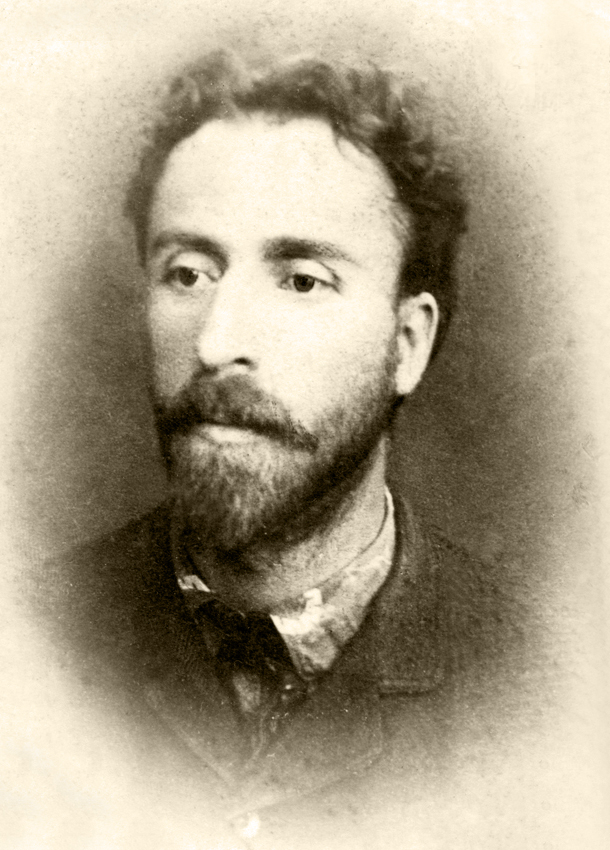Egnate Ninoshvili on:
[Wikipedia]
[Google]
[Amazon]
 Egnate Tomas dze Ninoshvili (17 February 1859 – 12 May 1894) was a
Egnate Tomas dze Ninoshvili (17 February 1859 – 12 May 1894) was a
Georgian
Georgian may refer to:
Common meanings
* Anything related to, or originating from Georgia (country)
** Georgians, an indigenous Caucasian ethnic group
** Georgian language, a Kartvelian language spoken by Georgians
**Georgian scripts, three scrip ...
writer and social democratic
Social democracy is a political, social, and economic philosophy within socialism that supports political and economic democracy. As a policy regime, it is described by academics as advocating economic and social interventions to promote soci ...
activist.
Early life and education
Ninoshvili was born in a poor peasant family in Kela village,Guria
Guria ( ka, გურია) is a region (''mkhare'') in Georgia, in the western part of the country, bordered by the eastern end of the Black Sea. The region has a population of 113,000 (2016), with Ozurgeti as the regional capital.
Geography
...
region in western Georgia
Georgia most commonly refers to:
* Georgia (country), a country in the Caucasus region of Eurasia
* Georgia (U.S. state), a state in the Southeast United States
Georgia may also refer to:
Places
Historical states and entities
* Related to the ...
. He studied at the Ozurgeti seminary but was expelled following a student protest. He then worked as a school teacher, telegraphist, typesetter, in a refinery and in a mine. For a brief period he studied in Montpellier
Montpellier (, , ; oc, Montpelhièr ) is a city in southern France near the Mediterranean Sea. One of the largest urban centres in the region of Occitania (administrative region), Occitania, Montpellier is the prefecture of the Departments of ...
, France.
Professional activities
His literary career started in 1887, with publications in ''Iveria'', a literary and political newspaper. His short stories and novels, relating the hard life of Georgian peasants and their oppression by tsarist officials, include ''Gogia Uishvili'' (1890), ''Lake Paliastomi'' (1891), ''Simona'' (1892) and ''Kristine'' (1893). In 1892, Ninoshvili was one of the founders of ''Mesame Dasi
Mesame Dasi (Georgian: მესამე დასი) was the first social-democratic party in the Caucasus, based in Tbilisi, Georgia (country), Georgia. It was founded in 1892 by Egnate Ninoshvili and M. G. Tskhakaya as a literary-political gro ...
'' ("Third Generation"), a Marxist organisation based in Tbilisi
Tbilisi ( ; ka, თბილისი ), in some languages still known by its pre-1936 name Tiflis ( ), is the Capital city, capital and the List of cities and towns in Georgia (country), largest city of Georgia (country), Georgia, lying on the ...
that no other than Joseph Stalin
Joseph Vissarionovich Stalin (born Ioseb Besarionis dze Jughashvili; – 5 March 1953) was a Georgian revolutionary and Soviet political leader who led the Soviet Union from 1924 until his death in 1953. He held power as General Secreta ...
joined in 1898. It was through his involvement with ''Mesame Dasi'' that Stalin was first introduced to the ideas of Karl Marx
Karl Heinrich Marx (; 5 May 1818 – 14 March 1883) was a German philosopher, economist, historian, sociologist, political theorist, journalist, critic of political economy, and socialist revolutionary. His best-known titles are the 1848 ...
. However, the group was too moderate for Stalin's taste and he became discontented with the viewpoints of the majority. Because of Stalin's sympathies toward Bolsheviks
The Bolsheviks (russian: Большевики́, from большинство́ ''bol'shinstvó'', 'majority'),; derived from ''bol'shinstvó'' (большинство́), "majority", literally meaning "one of the majority". also known in English ...
, he found himself constantly at odds with the others in the group.
Death and legacy
Ninoshvili died of tuberculosis in 1894, aged 35. His historical novel ''The Guria Uprising'', about the 1841 peasant rebellion in Guria, was published posthumously in 1902. The first Georgian feature film, ''Kristine'' (1916-1918) was based on his short story of the same name. In 1948, a house that he had lived in at Archeuli village, Guria was converted into a museum.References
External links
1859 births 1894 deaths Novelists from Georgia (country) 19th-century writers from Georgia (country) Marxists from the Russian Empire People from Guria Georgian independence activists Writers from the Russian Empire {{Georgia-writer-stub